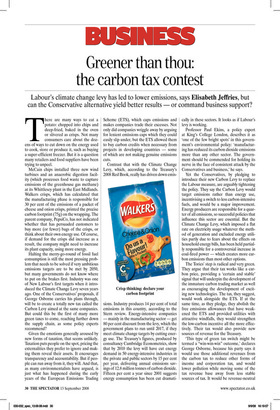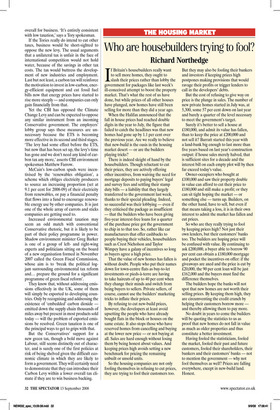Greener than thou: the carbon tax contest
Labour’s climate change levy has led to lower emissions, says Elisabeth Jeffries, but can the Conservative alternative yield better results — or command business support?
There are many ways to eat a potato: chopped into chips and deep-fried, baked in the oven or slivered as crisps. Not many consumers care about the dozens of ways to cut down on the energy used to cook, store or produce it, such as buying a super-efficient freezer. But it is a question many retailers and food suppliers have been trying to unpeel.
McCain chips installed three new wind turbines and an anaerobic digestion facility (which processes food waste to capture emissions of the greenhouse gas methane) at its Whittlesey plant in the East Midlands. Walkers crisps, which has calculated that the manufacturing phase is responsible for 30 per cent of the emissions of a packet of cheese and onion crisps, printed the precise carbon footprint (75g) on the wrapping. The parent company, PepsiCo, has not indicated whether that has persuaded customers to buy more (or fewer) bags of the crisps, or think about their own energy use. Of course, if demand for the crisps did increase as a result, the company might need to increase its plant capacity, using more energy.
Halting the merry-go-round of fossil fuel consumption is still the most pressing problem that needs to be solved if very ambitious emissions targets are to be met by 2050, but many governments do not know where to put on the brakes first. Industry was one of New Labour’s first targets when it introduced the Climate Change Levy seven years ago. One of the Conservatives’ proposals, if George Osborne carries his plans through, will be to create a totally new tax called the Carbon Levy aimed at the same companies. But could this be the first of many more green taxes to come, reaching further down the supply chain, as some policy experts recommend?
Given the emotions generally aroused by new forms of taxation, that seems unlikely. Taxation puts people on the spot, pricing the externalities they prefer to ignore and making them reveal their assets. It encourages transparency and accountability. But if people can run away from it, they will. And that, as many environmentalists have argued, is just what has happened during the early years of the European Emissions Trading Scheme (ETS), which caps emissions and makes companies trade their excesses. Not only did companies wriggle away by arguing for lenient emissions caps which they could easily slip under, but the ETS allowed them to buy carbon credits when necessary from projects in developing countries — some of which are not making genuine emissions cuts.
Contrast that with the Climate Change Levy, which, according to the Treasury’s 2008 Red Book, really has driven down emis sions. Industry produces 14 per cent of total emissions in this country, according to the Stern review. Energy-intensive companies — mainly in the manufacturing sector — get 80 per cent discount from the levy, which the government plans to run until 2017, if they meet climate change targets by cutting energy use. The Treasury’s figures, produced by consultancy Cambridge Econometrics, show that by 2010 the levy will have cut energy demand in 50 energy-intensive industries in the private and public sectors by 15 per cent per year, delivering annual emissions savings of 12.8 million tonnes of carbon dioxide. Fifteen per cent a year since 2001 suggests energy consumption has been cut dramati cally in these sectors. It looks as if Labour’s levy is working.
Professor Paul Ekins, a policy expert at King’s College London, describes it as ‘one of the few bright spots’ in this government’s environmental policy: ‘manufacturing has reduced its carbon dioxide emissions more than any other sector. The government should be commended for holding its nerve in the face of consistent attack by the Conservatives and business,’ he says.
Yet the Conservatives, by pledging to introduce their new Carbon Levy to replace the Labour measure, are arguably tightening the policy. They say the Carbon Levy would target emissions rather than energy use, incentivising a switch to less carbon-intensive fuels, and would be a major improvement. Energy producers are responsible for a quarter of all emissions, so successful policies that influence this sector are essential. But the Climate Change Levy, which imposed a flat rate on electricity usage whatever the method of generation and excluded energy utilities partly due to fears about the effects on household energy bills, has been held partially responsible for a controversial increase in coal-fired power — which creates more carbon emissions than most other options.
The Tories’ step is radical and very green. They argue that their tax works like a carbon price, providing a ‘certain and stable’ signal that will underpin the development of the immature carbon trading market as well as encouraging the development of exciting new technologies. The tax, they suggest, would work alongside the ETS. If at the same time, as they pledge, they abolish the free emissions allowances that have weakened the ETS and provided utilities with attractive windfalls, they would strengthen the low-carbon incentive all the more effectively. Their tax would also provide new sources of revenue for the Treasury.
‘This type of green tax switch might be termed a “win-win-win” outcome,’ declares George Osborne, because his party says it would use those additional revenues from the carbon tax to reduce other forms of income and corporation tax, and would lower pollution while moving some of the tax revenue base away from less stable sources of tax. It would be revenue-neutral overall for business. ‘It’s entirely consistent with low taxation,’ says a Tory spokesman.
If the Tories really do intend to cut other taxes, business would be short-sighted to oppose the new levy. The usual arguments that a unilateral tax is unfair in the face of international competition would not hold water, because of the savings in other tax costs. The tax would buttress the development of new industries and employment. Last but not least, a carbon tax will reinforce the motivation to invest in low-carbon, energy-efficient equipment and cut fossil fuel bills now that energy prices have started to rise more steeply — and companies can only gain financially from that.
Yet the CBI has opposed the Climate Change Levy and can be expected to oppose any similar instrument from an incoming Conservative government. The employers’ lobby group says these measures are unnecessary because the ETS is becoming more effective in its second and third stages. ‘The levy had some effect before the ETS, but now that has been set up, the levy’s time has gone and we don’t need any kind of carbon tax any more,’ asserts CBI environment spokesman Matthew Farrow.
McCain’s low-carbon spuds were incentivised by the ‘renewables obligation’, a scheme which obliges electricity producers to source an increasing proportion (set at 9.1 per cent for 2008-09) of their electricity from renewables, or pay a financial penalty that flows into a fund to encourage renewable energy use by other companies. It is just one of the whole array of carrots and sticks companies are getting used to.
Increased environmental taxation may seem an odd match with conventional Conservative rhetoric, but it is likely to be part of their policy programme in power. Shadow environment minister Greg Barker is one of a group of leftand right-wing experts and politicians sitting on the board of a new organisation formed in November 2007 called the Green Fiscal Commission, whose aim is to ‘break the political logjam surrounding environmental tax reform and... prepare the ground for a significant programme of green fiscal reform’.
They know that, without addressing emissions effectively in the UK, some of them will simply be exported to developing countries. Only by recognising and addressing the existence of ‘embedded’ carbon dioxide — emitted down the supply chain thousands of miles away but present in most products sold today — will the problem of exported emissions be resolved. Green taxation is one of the principal ways to get to grips with that.
But the Conservatives’ support for a new green tax, though a bold move against Labour, still seems distinctly out of character, and is surely one of the first policies at risk of being shelved given the difficult economic climate in which they are likely to form a government. They will certainly need to demonstrate that they can introduce their Carbon Levy within a lower overall tax climate if they are to win business backing.











































































 Previous page
Previous page